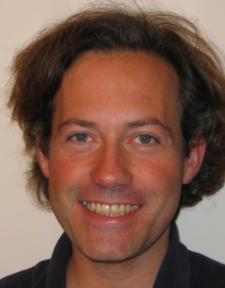Registrations
Welcome

Deep learning and personalized models for robust perception in human-robot interactions
In the future, more and more systems and robots will have to co-exist with humans in dynamic environments. In order for them to understand the social scene, to pro-actively interact autonomously and naturally with people or groups of people in function of their physical accessibility or social availability, and in general to monitor interactions, it is crucial to endow them with efficient multi-modal sensing and situated perception capabilities.
The aim of our research is to develop such sensing methodologies fusing the different streams of information (audio, RGB-Depth, robot and task state) to detect and track the perceived state and activity of the different people along several dimensions: physical states (location, trajectory, pose, speaking status), social category (gender, age group), non-verbal cues related to body language like gestures or attentional cues.
In this talk, I will present different works around this topic revolving around sound source and human voice localization, 3D head pose tracking under 360 degrees, as well as gaze and attention modeling. Our main goals were to investigate the use of computer vision and deep neural network architectures for the different sensing tasks, including relying on synthetic data for obtaining sufficient amount of training data, or building personalized models through online learning or adaptation, potentially taking advantage of priors on social interactions to obtain weak labels for model adaptation.
Coffe break

at the venue
Session chair: Benoit Huet, EURECOM
Semantic Signatures for Urban Visual Localization
Li Weng, Bahman Soheilian and Valérie Gouet-Brunet
Learning Prototypes for Visual Relationship Detection
François Plesse, Alexandru Ginsca, Bertrand Delezoide and Françoise Prêteux
Diffusion by Exchanges in HB-Graphs: Highlighting Complex Relationships
Xavier Ouvrard, Jean-Marie Le Goff and Stéphane Marchand-Maillet
A New Image Segmentation Approach Based on the Louvain Algorithm
Thanh-Khoa Nguyen, Mickaël Coustaty and Jean-Loup Guillaume
Bark Identification using Improved Statistical Radial Binary Patterns
Safia Boudra, Itheri Yahiaoui and Ali Behloul
Lunch
at the venue
Session chair: Klaus Schoeffmann, Klagenfurt University
Cardio-Pulmonary Resuscitation (CPR) Scene Retrieval from Medical Simulation Videos using Local Binary Patterns Over Three Orthogonal Planes
Anju Panicker Madhusoodhanan Sathik, Hichem Frigui and Aaron Calhoun
MRI Brain Tumor Segmentation Combining Saliency and Convolutional Network Features
Petra Takács and Andrea Manno-Kovacs
Towards Independent Stress Detection: a Dependent Model using Facial Action Units
Carla Viegas, Shing-Hon Lau, Roy Maxion and Alexander Hauptmann
Automatic Detection of Patient with Respiratory Diseases using Lung Sound Analysis
Gaetan Chambres, Pierre Hanna and Myriam Desainte-Catherine
Activity Recognition from Wearable Cameras
Panagiotis Giannakeris, Konstantinos Avgerinakis, Stefanos Vrochidis and Ioannis Kompatsiaris
Coffe break

at the venue
Session chair: Jenny Benois-Pineau, LABRI
SSKSRIF: Scale and Rotation Invariant Features based on Spatial Space of Keypoints for Camera-Based Information Spotting
Quoc Bao Dang, Mickaël Coustaty, Muhammad Muzzamil Luqman, Jean-Marc Ogier and Cao De Tran
Embedding Images and Sentences in a Common Space with a Recurrent Capsule Network
Danny Francis, Benoit Huet and Bernard Merialdo
Generating Visual Clouds from Multiplex Networks for TV News Archive Query Visualization
Haolin Ren, Benjamin Renoust, Marie-Luce Viaud, Guy Melançon and Shin'Ichi Satoh
Visual Sentiment Analysis Based on Objective Text Description of Images
Alessandro Ortis, Giovanni Maria Farinella, Giovanni Torrisi and Sebastiano Battiato
Annotating Images with Drawings through Gameplay for Drawing based Image Retrieval
Zhan Xu and Guoping Qiu
Icebreaking cocktail at the venue with Live music
Registrations
Day opening

Content based multichannel bioacoustic indexing & autoencoder for 3D whale survey
in collaboration with Phd students Marion Poupard and Ferrari Maxence, CNRS LIS Toulon and with Seaproven SA
In this talk, we first recall the main objectives of massive bioacoustic indexing.
We will present usual and more advanced stereophonic detection of Whales from long term submarine observatory.
We demonstrate algorithms working on bottom mounted hydrophone antenna or fixed under mobile autonomous vehicles to computed detailed 3D tracks of the dive of the whale during hours.
We then propose a new paradigm towards deep learning of multichannel bioacoustic regresentation from raw audio. We thus take advantages of stereophony (or multiphony)
to elaborate new objective loss function for transient detection, denoising and accurate estimation Time Delay of Arrival (TDOA).
We train autoencoder on stereo transients from whale recordings, and show how to improve TDOA estimation taking advantages of estimator from learned limited development of a transfer function.
We then discuss perspectives towards embedded deep learning method in autonomous vehicle to index biodiversity of the abyss.
Coffe break

at the venue
Session chair: Andrea Manno-Kovacs, SZTAKI
Saliency Weighted Convolutional Features for Instance Search
Eva Mohedano, Kevin McGuinness, Xavier Giro-I-Nieto and Noel O'Connor
Introduction of Explicit Visual Saliency in Training of Deep CNNs: Application to Architectural Styles Classification
Abraham Montoya Obeso, Jenny Benois-Pineau, Mireya S. Garcia Vazquez and Alejandro Alvaro Ramirez Acosta
Interestingness for Immersive Content: Prediction and Use
Gwenaelle Marquant, Claire-Hélène Demarty, Christel Chamaret, Joel Sirot and Louis Chevallier
Refining and Evaluating a Video Sharpness Metric
Stefanie Wechtitsch, Werner Bailer and Lucas Paletta
UNNA: A Unified Neural Network for Aesthetic Assessment
Larbi Abdenebaoui, Benjamin Meyer, Albert Bruns and Susanne Boll
Lunch
at the venue
Session chair: Alan HANJALIC, TU Delft
Latent Feature Combination for Multi-Context Music Recommendation
Martin Pichl and Eva Zangerle
Detection and Localization of Partial Audio Matches
Milica Maksimović, Patrick Aichroth and Luca Cuccovillo
Mastering Occlusions by Using Intelligent Facial Frameworks Based on the Propagation of Movement
Delphine Poux, Benjamin Allaert, José Mennesson, Nacim Ihaddadene, Ioan Marius Bilasco and Chaabane Djeraba
Deep Multimodal Features for Movie Genre and Interestingness Prediction
Olfa Ben Ahmed and Benoit Huet
Coffe break

at the venue
Ridiculously Fast Shot Boundary Detection with Fully Convolutional Neural Networks
Michael Gygli
CAD-SE: Discovering CAD Models on the Web
Christian Brosch, Andreas Seifert and Thomas Köllmer
DeCP-Live: A Web-Interface for DeCP, a Distributed High-Throughput CBIR System
Gylfi Þór Guðmundsson, Christian Andreas Jacobsen, Hilmar Tryggvason and Björn Þór Jónsson
Musical Gesture Recognition Using Machine Learning and Audio Descriptors
Paul Best, Jean Bresson and Diemo Schwarz
Dynamic Index Finger Gesture Video Dataset for Mobile Interaction
Cagan Arslan, Ioan Marius Bilasco and Jean Martinet

Boat trip on l’Espérance in the Bay of La Rochelle and around the Ré Island.
The boat l’Espérance is located in the old port of La Rochelle, at 10 minutes walk from the conference venue (see map below).

Enjeux socio-politiques de l’IA (Socio-political issues of AI)
Profitant des réussites spectaculaires des techniques de deep learning, les promesses de l’Intelligence artificielle (IA) sont revenues occuper le débat public. Dans cette conférence, on propose de retracer quelques aspects de l’histoire de l’Intelligence artificielle afin de comprendre les défis présents. Le « troisième printemps de l’IA » se caractérise, en effet, par le retour du paradigme connexionniste qui avait été marginalisé lors du « second printemps » de l’Intelligence artificielle dans les années quatre-vingt. La nouvelle vague de promesses de l’IA a pris forme grâce aux opportunités nouvelles offertes par les données massives et aux nouvelles capacités de calcul des ordinateurs. Mais, elle propose surtout une autre manière de rendre les machines « intelligentes ». Il ne s’agit plus de demander aux calculateurs de raisonner, mais bien d’apprendre des données et de former des modèles de prédiction à partir des données. Ce changement de paradigme de l’IA a de nombreuses conséquences : il propose une représentation différentes de la société qui s’appuie sur le comportement des individus plutôt que sur leurs catégories d’appartenance, il ouvre des possibilités d’automatisation du travail, il présente des opportunités nouvelles mais aussi des risques de biais dans les calculs. Cette conférence propose d’examiner les défis éthiques et politiques que pose les développements de l’IA.

Gala Dinner aboard l’Espérance boat.
L’Espérance is located in the old port of La Rochelle, at 10 minutes walk from the conference venue (see map below).
Registrations
BigEarth-Accurate and Scalable Processing of Big Data in Earth Observation
Begüm Demir
Urban Land Use Classification Based on Aerial and Ground Images
Rui Cao and Guoping Qiu
Overcoming Missing and Incomplete Modalities with Generative Adversarial Networks for Building Footprint Segmentation
Benjamin Bischke, Patrick Helber, Florian Koenig, Damian Borth and Andreas Dengel
A Study on the Sensitivity-Based Discriminative Hyperspectral Image Content Representation
Olfa Ben Ahmed, Thierry Urruty, Noel Richard and Christine Fernandez
Active Learning to Assist Annotation of Aerial Images in Environmental Surveys
Mathieu Laroze, Romain Dambreville, Chloé Friguet, Ewa Kijak and Sébastien Lefèvre
Session chairs: Sébastien Lefèvre, Université de Bretagne Sud and Josiane Mothe, IRIT Toulouse
Coffee break

at the venue
Coupled Ensembles of Neural Networks
Anuvabh Dutt, Denis Pellerin and Georges Quénot
Temporal Compression and Fast Matching of Hand-crafted and Deep Features of Video Segments
Werner Bailer and Stefanie Wechtitsch
Sport Action Recognition with Siamese Spatio-Temporal CNNs: Application to Table Tennis
Pierre-Etienne Martin, Jenny Benois-Pineau, Renaud Peteri and Julien Morlier
Deep 3D Flow Features for Human Action Recognition
Athanasios Psaltis, Georgios Papadopoulos and Petros Daras
Action Tube Extraction based 3D-CNN for RGB-D Action Recognition
Zineng Xu, Veronica Vilaplana and Josep Ramon Morros
Session chair: Georges Quénot, LIG-CNRS
Closing remarks
| CBMI 2018 | ||||
| Conference Program | ||||
| Tuesday, September 4th | Wednesday, September 5th | Thrusday, September 6th | ||
| 08:15-08:30 | Registrations | Registrations | Registrations/Day opening | |
| 08:30-08:45 | Special session 2 Indexing, Retrieval, Annotation And Mining in Earth Observation (IR4EO) |
|||
| 08:45-09:00 | Welcome | Day opening | ||
| 09:00-10:00 | Keynote 1 Deep learning and personalized models For robust perception in human-robot interactions by Jean-Marc ODOBEZ (EPFL) |
Keynote 2 Content based multichannel bioacoustic indexing & autoencoder for 3D whale survey by Hervé GLOTIN (Univ. Toulon, IUF) |
||
| 10:00-10:15 | Coffee break (at the venue) | Coffee break (at the venue) | ||
| 10:15-10:30 | Coffee break (at the venue) | |||
| 10:30-12:15 | Oral session 1 Multimedia Analysis and Representation |
Oral session 3 Saliency and quality of multimedia contents |
Oral session 4 Deep Learning for Multimedia Indexing and Analysis |
|
| 12:15-13:00 | Lunch (at the venue) | Lunch (at the venue) | Closing remarks | |
| 13:00-14:00 | ||||
| 14:00-15:45 | Special session 1 Analysis of Multimedia Data for Medicine and Health |
Oral session Best CBMI 2018 papers |
||
| 15:45-16:00 | Coffee break (at the venue) | Coffee break (at the venue) | ||
| 16:00-17:30 | Oral session 2 Multimodal data Retrieval |
Posters and Demos | ||
| 17:30-17:45 | ||||
| 17:45-18:00 | Open to the Public (in french) Socio-political issues of AI by Dominique Cardon (Sciences Po Paris) |
|||
| 18:00-19:00 | Welcome reception | Boat trip in the Bay of La Rochelle and around the Ré Island | ||
| 19:00-19:30 | ||||
| 19:30-22:30 | Gala Dinner aboard l’Espérance boat in the port of La Rochelle | |||